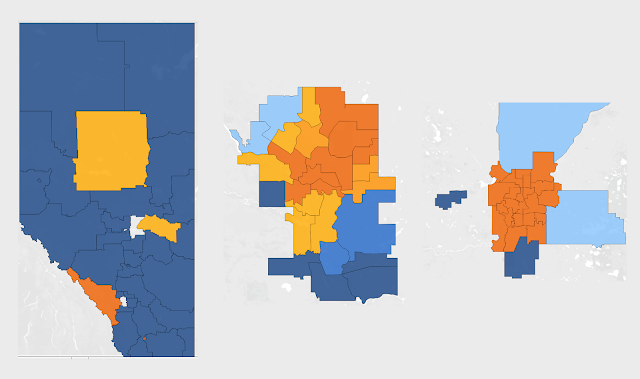While it looked like this Alberta could become a really close one, the reality after a full campaign is that there is a clear favorite: Danielle Smith and the UCP. Her chances aren't 100% but they are high enough for me to make a confident call. If you feel my polling average is wrong, just use your own numbers in the simulator. Also follow me on Twitter for more updates and data.
The NDP does have a chance but it's a very narrow path to 44 seats. Basically they would need to sweep all the projected close races in Calgary. That either requires an incredible vote efficiency and/or an underestimation by the polls. Given Alberta, the latter is quite unlikely. It's not impossible though and some polls (the ThinkHQ one for Calgary or the Mainstreet riding polls in the same city) have shown situations where the NDP was at +6 to +11 in the city and that could be enough to win 44+ seats. Forum released a poll late tonight and they had the NDP +2 in the CMA. That would likely mean +6-7 in the city. Their seat projections? 45 UCP, 42 NDP. My model is the same, if I modify the numbers to boost the NDP by 2 points in the Calgary CMA and decrease the UCP by 2, I get 44-43.
The math here shows two things. First, the regional polling average is such that the UCP is still leading in the Calgary region. And that means a UCP government. The NDP cannot win the election without winning in Calgary overall. Secondly, even if the polls are off by 4 points in total, I still think the UCP wins! So again, a surprise is possible but is far from likely. Especially since polls in Alberta have had a strong tendency to underestimate the Conservatives (5 points in 2019 and 2021; almost as much in 2015).
The real uncertainty is more about the size of the UCP majority. There are so many close races in Calgary, all with their own variables (candidates, demographics, etc) that it's not really possible to be sure what will happen. The difference between being right or wrong in your projections could very well come down to luck. I'd say that any result between 45-52 for the UCP would not surprise me. The confidence intervals you see below are at 95% confidence. If I were to reduce to 50% confidence, you indeed get 45-52. It only takes a few points in Calgary for the projections and the map to look very different. But it takes quite a polling miss for a NDP win.
This campaign didn't turn out to be a very interesting one in my opinion. The NDP failed to make a case as to why people should fire Smith beyond a few scandals here and there. They never successfully made the case Albertans would be better off under a NDP government. There was a time in the middle of the campaign where things looked to go the NDP way but it didn't last very long. Smith winning the debate also helped a lot, especially since Google Trends seem to indicate people paid the most attention during that time.
One odd thing with polls has been their tendency to see the NDP doing relatively well in the rest of Alberta (sometimes as high as 40%!; they got 21% in 2019) while the UCP is showing good numbers in Edmonton. My projections have Lesser Slave Lake close but I don't believe my projections (but hey, that's what the model says) and the NDP winning Lethbridge East. The UCP is holding strong in the Edmonton ring/donut and I know some UCP members are convinced they'll actually win seats in Edmonton. I doubt it but look at the South of the city if you are looking for a surprise.
Ultimately it comes down to Calgary and, as mentioned before, the polls are simply not showing the lead the NDP needs. Polls have been all over the place there but that would be consistent with the UCP and NDP being close to each other. I have worked a lot harder on Calgary. I looked at the areas that went left between 2019 and 2021 (federal level). I have made adjustments based on quadrants from the few polls we got. Still, as I mentioned previously, it's hard to be super confident on any close races.
So anyway, here are the projections. Thank you for following me (mostly on Twitter these days) and I hope you enjoyed the coverage of this election. It sure was more interesting than the Ontario and Quebec ones!
The map
Interactive version here.
Detailed projections:

















